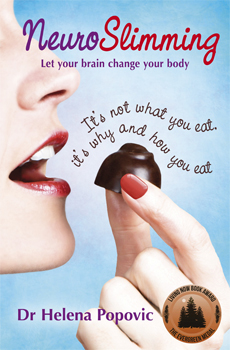NeuroSlimming

NeuroSlimming
--NeuroSlimming is not about calorie restriction, exercise, motivation, mindset, willpower or positive psychology. These things play a role but NeuroSlimming goes much deeper into the very essence of how brain cells communicate with each other and with the rest of the body."
The world is drowning in information on health, nutrition and exercise yet 95 per cent of people who try to lose weight put it all back on, plus more, within 12 months of starting any sort of weight loss regime.
Even diets that incorporate mindset and motivation lead to short-term results at best. Why? Because the key factor in successful weight management has been ignored: the brain.
Dr Popovic started her own dieting career at age 13 with the Israeli Army Diet, which launched her into a decade of eating mayhem. Now a leading authority on improving brain function, Dr Popovic brings the latest discoveries in brain science to the field of weight management, sharing the science and the stories behind the success of her groundbreaking program.
Incorporating a set of 28 -missions' to set you up for slimming success, NeuroSlimming gives the reader a deep understanding of how the brain and body work together to achieve vibrant health, lasting vitality and sustainable body fat reduction.
Learn how to recognise what your body really needs, adjust portion sizes without your brain noticing, embrace hunger as a healthy signal and discover why slipping on a blindfold can help curb a binge.
By providing a mind plan, not a meal plan, NeuroSlimming sets you free of dieting, struggling, worrying, wishing, craving and emotional eating. Free of rigid, restrictive, gruelling regimes and pills, powders, potions or lotions. Free of guilt and anguish about what, when and how much to eat. Free to make peace with your body and live life to the full.
A go-to bible for successful weight management, NeuroSlimming has been awarded the Bronze Medal in the health and wellness category at the International Living Now Awards. These awards celebrate the innovation and creativity of books that enhance the quality of our lives. The 2016 winners are recognised as the year's best books for better living.
Dr Helena Popovic graduated from the University of Sydney with a degree in medicine in 1995. With more than 20 years of clinical experience, Dr Popovic now specialises in lifestyle-based diseases, weight management and improving brain function.
Throughout her years in medical practice Dr Popovic has lectured students, nurses and fellow doctors. She is a regular presenter for the Australian College of Weight Management and The Australian and New Zealand Eating Disorders and Obesity Conference. In 2015, Dr Popovic was a keynote speaker at the inaugural Global Weight Management Congress in Brisbane.
NeuroSlimming
Penguin Books
Author: Dr Helena Popovic
RRP: $35
Interview with Dr Helena Popovic
Question: Why did you write NeuroSlimming?
Dr Helena Popovic: I wrote NeuroSlimming because my patients and retreat participants asked me to! I have been running weight management weekends for many years and people wanted a written record of the steps and activities so they could follow them when they went back home.
I started running retreats because I saw that despite the superabundance of information on health, nutrition and exercise, people were continuing to gain excess body fat and the world as a whole was getting sicker and unhealthier. I discovered the reason through decades of treating patients: there was a missing piece in the weight loss puzzle. NeuroSlimming provides the missing link that enables a person to shed excess body fat even if they've had a lifetime of unsuccessful yoyo dieting.
The success of NeuroSlimming relies on using your brain to change your body. It is not about diets, exercise, motivation, mindset, willpower or positive psychology. It goes much deeper into the very essence of how our brain cells communicate with each other and with the rest of the body to influence our appetite, assimilation of food, metabolism, weight set-point and weight distribution.
Question: Why is BMI an out-dated form of measurement?
Dr Helena Popovic: Despite most health professionals still relying on Body Mass Index to determine whether a person is overweight or obese, I advise individuals to Bin the BMI! Why? Because BMI only looks at height and weight and does not take into account muscularity, bone structure or body shape. Two people can have the same BMI but one could be fit, healthy and muscular, while the other could be sedentary and carry excess body fat.
Secondly, BMI focuses on weight reduction – and weight reduction does NOT equal body fat reduction. Losing weight is not the same as losing fat because when a person sheds weight on a diet, they lose more muscle than fat and they probably also lose bone. This is not healthy. Loss of bone leads to osteoporosis and loss of muscle slows metabolic rate so that you require less food just to maintain your weight. Muscle loss also increases the risk of diabetes and inflammatory diseases.
Then there's another catch: when it comes to body fat, it's like real estate. What matters is location, location, location. Fat under the skin is called subcutaneous and is not unhealthy. It keeps us warm and stores excess calories for when we need them. Fat around internal organs is called visceral (VAT) and this is what causes a multitude of health problems including diabetes, heart disease, cancer and Alzheimer's.
If people want to be guided by a number, the best thing to aim for is a waist circumference of below 94cm for men and below 80cm for women. A smaller waist circumference correlates much more strongly with good health than does a lower body weight.
Finally, it is far healthier to focus on being fit (eating well and exercising regularly) than on focusing on reducing fat. People who are slim but don't exercise die at a younger age than people who have excess body fat but engage in 30 minutes of daily exercise. Focusing on fitness not fatness leads to lasting success, better health, more energy and a longer life. Focusing on weight is an unhealthy and self-defeating goal.
Question: How can we adapt our eating for a healthier 2017?
Dr Helena Popovic: Focus on WHY and HOW you eat, rather than on WHAT you eat because the WHY and HOW determine the what.
The first step in moving towards a healthier 2017 is to pause before every mouthful of food and ask yourself: -Am I really hungry or do I just want to change how I'm feeling?' If you're physically hungry, eat! If you're reaching for food because you're sad, angry, bored, lonely, stressed, depressed or a myriad of other non-hungry reasons, get into the habit of managing your emotions through an activity that doesn't involve food. This takes a conscious effort to begin with but if you plan ahead and know you'll put on some music, go for a walk, ring a friend, take a bath, read a joke or do something that you find nurturing, you can replace the habit of comfort eating. The key is to plan ahead and to make the alternative activity easy to do.
If you're not sure whether you're physically or emotionally hungry, have a glass of water (because thirst can also sometimes masquerade as hunger), wait 15 minutes and see if the urge to eat subsides. If not, ask yourself the question again. Some people have overridden their hunger through dieting for so long they don't know how to recognise it any more. But if you keep asking the question you will retrain your brain to give you stronger signals and you will soon simply know if you are hungry or hANGRY.
With respect to the HOW of eating, make 2017 the year that you allow yourself to appreciate and savour every mouthful. That means when you eat, just eat. Don't be multitasking, watching TV, driving, working on the computer or doing anything else. The brain can only focus on one thing at a time. We miss out on half the eating experience if we're simultaneously doing something else. This leads to eating more than we need. When we have our full attention on what we are eating and when we engage all our senses, we eat more slowly, we taste more, enjoy our food more and we notice as we are getting full so we stop sooner. We don't overeat because something tastes too good. We overeat when we don't taste things fully. Do this especially if you reach for junk food. You'll find you won't eat nearly as much as usual because you'll become aware that it is not nourishing your body and you'll spontaneously stop eating before you finish. Many of my readers have told me that I've ruined fast food for them because they stopped to taste it for the first time and they realised they were not actually enjoying it!
Question: How can we spot and avoid hidden sugars in our food?
Dr Helena Popovic: First and foremost, eat real, whole food as close to nature as possible. If we avoid all packaged, processed, refined and fast foods we would not have to worry about overeating sugar because foods in nature that contain sugar also contain a compensatory amount of water and fibre. The water and fibre fill us up before we eat too much. Simply put, you'd give yourself a stomach-ache or start to feel bloated. The one exception is honey. It does not contain fibre but is sickly sweet in large quantities and counts towards our daily sugar allowance.
Whole fruits and vegetables, natural (unflavoured and unsweetened) dairy products, eggs, fish, poultry and meat pose no threats in terms of excess sugar. But the minute we tamper with food, for example, add sauces, dressings, flavourings and preservatives, or remove fibre, skins and husks, we automatically add LOADS of sugar even if we can't taste it.
If you eat packaged food including sauces, breakfast cereals, flavoured yoghurts, tinned fruits, canned vegetables, frozen meals, sweets, pastries, cakes, biscuits or muesli bars then you need to become savvy in calculating the sugar content of what you are buying.
What constitutes too much sugar? The World Health Organisation (WHO) recommends that a safe level of sugar consumption (ie unlikely to cause disease) is four teaspoons per day for children under the age of 12, six teaspoons per day for women, and nine teaspoons per day for men. Even this is probably generous, but given that the average Australian consumes over 20 teaspoons per day, the WHO targets are a good start.
Where is all this added sugar in our diet coming from? Soft drinks are the biggest culprits but sports drinks and juices are also significant contributors. The remainder comes from processed foods even if we believe them to be healthy. So here is how to calculate your sugar intake. One teaspoon of sugar is approximately 4 grams. Ignore anything written about the health value of the food on the front of the packaging. This is purely marketing and most of it is cleverly deceptive. Examine the nutrition panel on the back. Look to see how many grams of sugar per serve. Divide the grams by four to calculate the number of teaspoons. Then look to see how many servings are in the packet. Ask yourself how many serves you'd be likely to eat in one sitting and multiply the number of servings you will eat by the number of teaspoons. Are you surprised by how many teaspoons of sugar are lurking in your favourite breakfast cereal?
Question: And, why is sleep more important than gym?
Dr Helena Popovic: Sleep deprivation has a profound effect on hunger, metabolism and fat deposition. If you find yourself thinking -I'm starving!' consider the possibility that you might be starved of sleep rather than food.
Sleep deprivation disrupts all our hormonal processes so that we are driven to eat more, move less and deposit fat around the abomen – a lethal combination, literally. We produce more cortisol, less leptin, more ghrelin and less GLP-1 (all hormones involved in metabolism and body fat regulation) – and this disruption to our biochemistry drives up hunger and food cravings, makes us feel lethargic and leads to increased fat storage. In addition, we feel moody and are more prone to emotional eating, plus our will power and decision-making skills fall by the wayside. Aim for seven to nine hours a night to have an efficient metabolism and a body that guides you to eat no more than you really need. And as a bonus, you might even feel like going to the gym!
NeuroSlimming
Penguin Books
Author: Dr Helena Popovic
Interview by Brooke Hunter
MORE



